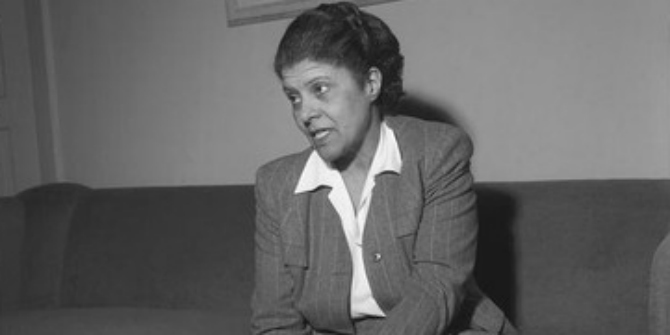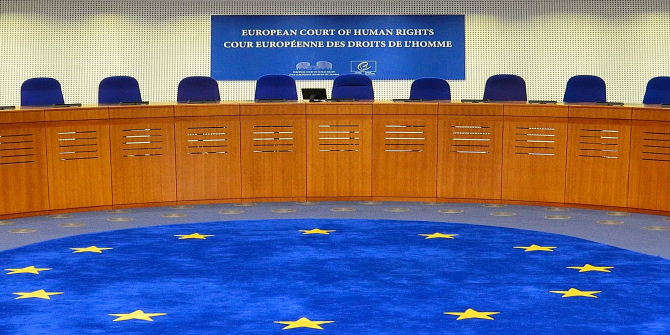 The past two decades have witnessed a proliferation of efforts to examine the impact of the Internet on structures of Islamic identity and authority across the Muslim world. John Sidel reviews Islam Dot Com, and finds that it provides a careful and critical reading of discussions and debates among Muslim internet users.
The past two decades have witnessed a proliferation of efforts to examine the impact of the Internet on structures of Islamic identity and authority across the Muslim world. John Sidel reviews Islam Dot Com, and finds that it provides a careful and critical reading of discussions and debates among Muslim internet users.
Islam Dot Com: Contemporary Islamic Discourses in Cyberspace. Mohammed el-Nawawy and Sahar Khamis. Palgrave Macmillan. Paperback Edition. June 2011.
Over the past two decades, scholars have begun to examine the transformative effects of ‘new media’ – most obviously the Internet – on the Muslim world. Scholars like Dale Eickelman, James Piscatori, Jon Anderson, and Greg Starrett, for example, have written about the myriad ways in which Islam can be ‘objectified’ and ‘functionalized’ through new forms of communication and representation across the world.
Meanwhile, José Casanova, John Bowen, and others have described the emergence of a ‘transnational Islamic public sphere’, even as Olivier Roy has depicted a ‘globalised Islam’, trends which are obviously embodied in as well as enabled and intensified by Muslim Internet users, whose cyber-peregrinations have been chronicled in two books by Gary Bunt. Meanwhile, of course, a cottage industry of counter-terrorism ‘experts’ has sprung up in recent years which has been closely monitoring the variegated virtual terrain of cyberjihad, even as more serious scholars of Islam have been tracking the ebb and flow of online salafi and sufi discourses and debates. Overall, the past two decades have witnessed a proliferation of efforts to examine the impact of the Internet on Muslim subjectivities, on the imagined community of the Ummah, on politics in the name of Islam, and on the structures of Islamic identity and authority across the Muslim world.
Against this backdrop, Mohammed el-Nawawy and Sahar Khamis’s book Islam Dot Com: Contemporary Islamic Discourses in Cyberspace represents only the latest in a long series of contributions to an ongoing debate about Islam in the contemporary world. El-Nawawy and Khamis are sophisticated scholars with a finely honed critical perspective on the Habermasian notion of the ‘public sphere’, and their textual analysis of threads on the discussion boards of three major Islamic websites is suitably nuanced, incisive, and illuminating. The authors’ conclusions are somewhat pessimistic: online deliberations facilitate neither ‘rational-critical discourse’ along the lines of a Habermasian public sphere, nor shura (consultation), ijtihad (independent interpretation), and ijma’ (consensus) in the Islamic tradition of intellectual debate. Thus, although the 2011 paperback edition of the book includes an epilogue which considers the use of social media in the Tunisian and Egyptian “revolutions,” el-Nawawy and Khamis suggest that we should not exaggerate – much less idealize – the nature and extent of the transformative impact of the new media on what Eickelman and Piscatori call “Muslim politics”.
For scholars already skeptical of notion of the “public sphere”, what, then, is the significance of the plethora of ongoing Islamic blogspots, chatrooms, webpages, and other virtual Habermasian “coffee houses” in cyberspace? El-Nawawy and Khamis’s book tends to support Olivier Roy’s arguments about the inherently fragmenting – and individuating – consequences of globalization on the structures of Islamic identity and authority. Islam Dot Com likewise confirms the accounts of Roy and other scholars with regard to the Internet’s impact on the social reproduction of knowledge of Islam, as it has multiplied the potential sources of interpretation of sacred texts while undermining claims to epistemological authority. Perhaps Islam Dot Com should also be read against Saba Mahmood’s much debated book Politics of Piety: The Islamic Revival and the Feminist Subject, which might suggest somewhat different conclusions with regard to the questions about “Muslim feminism” and “Islamic feminism” which are explored through the threads on various Islamic website discussion boards.
Alternatively, the very title of the book inadvertently suggests another avenue for further investigation. Islam Dot Com, after all, should really have been titled Islam Dot Net, as the book does not actually address questions of cyber-commerce among Muslim surfers of the Internet. But here it is worth recalling the French scholar Patrick Haënni’s notion of l’Islam de marché, the rise of a “market Islam” in which new forms of discourse and social relations are embedded not in a Habermasian public sphere but in a commodified realm of production and consumption, exploitation and accumulation. Scholars of “Muslim politics” in settings as diverse as Egypt, Indonesia, and Turkey have noted the growing political salience of this nexus of market Islam, as seen in the tight links between Muslim businessmen and parties like the Muslim Brotherhood, the PKS, and the AKP.
But whether the questions concern the possibilities for an Islamic public sphere, an Islamic feminism, an Islamic state, or an Islamic economy, the answers clearly do not lie in cyberspace alone. Islam Dot Com provides a careful and critical reading of discussions and debates among Muslim internet users, as contextualized against a careful and critical reading of scholarship on the notion of a transnational Islamic public sphere. But the book does not do much to explore the connections between the (self-)representations of Muslims on the Internet and the lived experiences, social relations, and political practices of Muslims in their off-line contexts.
Perhaps the next step for scholars working on the impact of the (no longer so) ‘new’ media is to follow Muslims and Muslim (inter)subjectivities not only – textually – through their wanderings in the blogspots, chat rooms, and Twitter feeds, but also – ethnographically – as they live, work, worship, and struggle in public squares and back alleys, mosques and madrasas, and homes and workplaces across the Muslim world.
———————————————————————
John Sidel is the Sir Patrick Gillam Professor of International and Comparative Politics at the LSE. Before taking up this post at the LSE in 2004, Professor Sidel taught for ten years at the School of Oriental and African Studies (SOAS), University of London. He received his BA and MA from Yale University (1988) and his PhD from Cornell University (1995). He specialises in the study of Southeast Asia and has thematic expertise in the areas of and interest in the study of politics, as reflected in his research, writing, and teaching: Local Politics, Religion and Politics and Nationalism and Transnational Forces. Read more reviews by John.








1 Comments